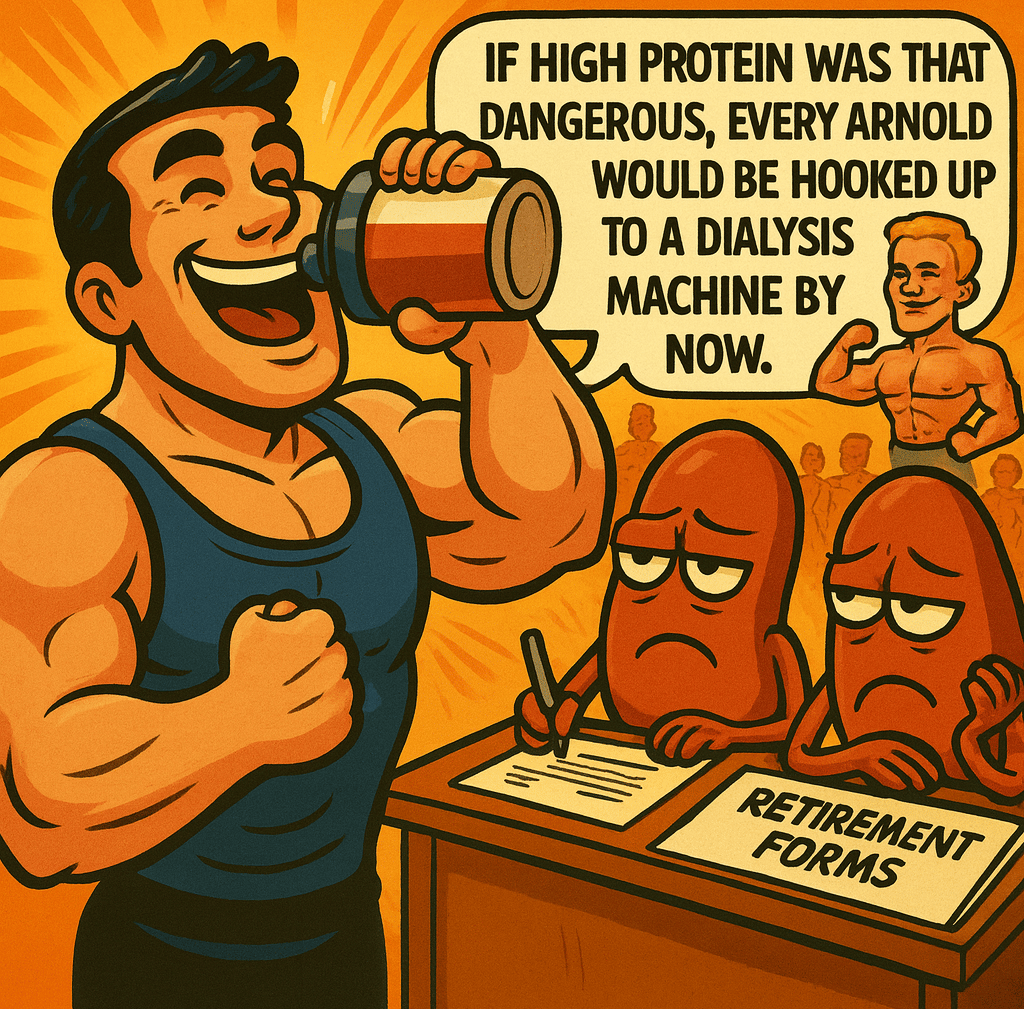Nutrition Myth #4: High-Protein Diets Damage Your Kidneys
Many believe eating too much protein harms the kidneys. Learn why this myth is false for healthy people, how protein supports recovery, satiety, and fat loss, and what the real takeaway is.
NUTRITION
Adi English
3 min read


🍗 Nutrition Myth #4: “High-Protein Diets Damage Your Kidneys”
📖 Article (~320 words)
So here we go again: people hear you eat chicken, eggs, and protein shakes every day, and suddenly you’re on a fast track to kidney failure. Like, relax — having a protein shake doesn’t mean your kidneys are filling out retirement paperwork. If high protein was that dangerous, every bodybuilder since Arnold would be hooked up to a dialysis machine by now.
Here’s the truth: for healthy people, a high-protein diet does not damage your kidneys. This myth mostly comes from studies done on people who already had kidney disease, where doctors limit protein to reduce stress on damaged organs. But if your kidneys are healthy, research shows even diets with double or triple the standard protein recommendation cause no harm.
In fact, protein is essential. It builds muscle, supports your immune system, and helps with recovery after exercise. A high-protein diet can also help with fat loss because protein increases satiety (feeling full), has a higher thermic effect (your body burns more energy digesting it), and protects muscle mass when you’re dieting.
Now, nuance: yes, if someone already has kidney disease, they should absolutely follow medical advice and possibly restrict protein. But for the average lifter, athlete, or even regular person trying to lose fat — more protein is usually better, not worse.
Your kidneys aren’t made of paper mâché. If they can deal with all the other things that people consume, they can handle protein easily. So stop stressing, the only thing dangerous about protein is running out of it.
Takeaway: High-protein diets are safe for healthy kidneys and hugely beneficial for strength, fat loss, and overall health.
🗂 Vocabulary
Kidneys – organs in your body that filter waste from the blood.
Simple: They clean your blood and remove waste.
Example: Healthy kidneys can handle a normal or high-protein diet.
Student example: ____________
High-protein diet – eating more protein than the standard recommendation.
Simple: A diet with lots of eggs, chicken, meat, and shakes.
Example: A high-protein diet helps build muscle.
Student example: ____________
Protein – a nutrient that builds and repairs muscles.
Simple: Found in meat, eggs, beans, dairy.
Example: Protein is important for athletes.
Student example: ____________
Recovery – how your body heals and gets stronger after stress or exercise.
Simple: Rest and food that help muscles heal.
Example: Protein helps recovery after hard workouts.
Student example: ____________
Satiety – the feeling of being full after eating.
Simple: Not hungry anymore.
Example: Protein increases satiety more than carbs or fat.
Student example: ____________
Thermic effect – the energy your body burns to digest food.
Simple: Calories burned while your body digests.
Example: Protein has a higher thermic effect than fat or carbs.
Student example: ____________
Muscle mass – the amount of muscle in your body.
Simple: The size and strength of your muscles.
Example: Protein helps protect muscle mass while dieting.
Student example: ____________
Restriction – a limit or control on something.
Simple: Cutting back or reducing.
Example: People with kidney disease may need protein restriction.
Student example: ____________
Paper mâché – a material made from paper and glue, weak and fragile.
Simple: Something very soft or easy to break.
Example: Your kidneys are not made of paper mâché.
Student example: ____________
Takeaway – the most important lesson or point.
Simple: The main thing to remember.
Example: The takeaway is that protein is safe for healthy kidneys.
Student example: ____________
📝 Exercises
Comprehension
Why do some people believe protein damages kidneys?
What do studies on healthy people show about high-protein diets?
How does protein help with fat loss?
What should people with kidney disease do about protein?
What is the main takeaway of the article?
Multiple Choice
What organs filter waste from the blood?
a) Lungs b) Kidneys c) Liver d) Muscles
Which nutrient has the highest thermic effect?
a) Fat b) Carbs c) Protein d) Fiber
Which benefit does protein NOT provide?
a) Satiety b) Building muscle c) Recovery d) Making you instantly fat
Who should restrict protein intake?
a) Healthy athletes b) People with kidney disease c) Children d) Everyone
What does “takeaway” mean here?
a) A fast-food meal b) The main lesson c) A protein supplement d) A delivery service
Fill in the Blank
Protein helps with building ______.
A high-protein diet supports ______ after training.
Protein increases ______, which helps people feel full.
The ______ effect means calories burned during digestion.
The main ______ is that protein is safe for healthy kidneys.
True/False
High-protein diets damage healthy kidneys. (False)
Protein helps protect muscle mass during dieting. (True)
Paper mâché is strong like real kidneys. (False)
Protein restriction may be needed for people with kidney disease. (True)
The article says protein is useless for athletes. (False)
Discussion
Why do you think people are afraid of eating too much protein?
Do you personally eat a high-protein diet?
What are your favorite sources of protein?
Why is protein important for people trying to lose weight?
What is your personal takeaway from this article?
